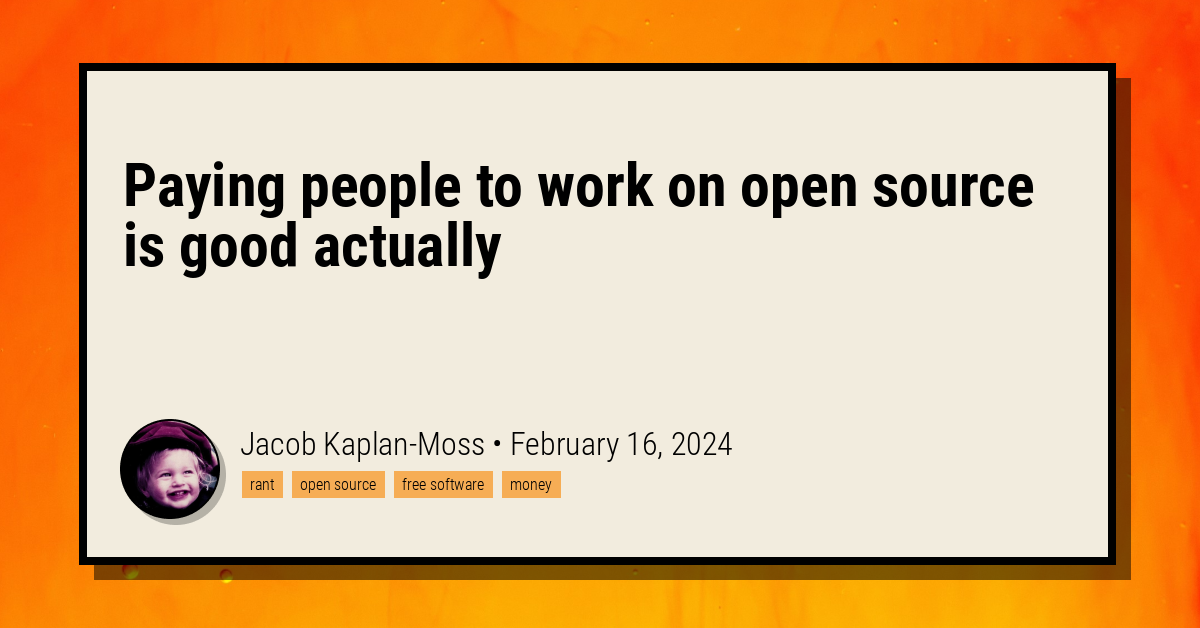I feel like this is a very modern problem with the community. I’ve been in open source for a long time, I’ve been employed by some of these companies to write open source things.
Most open source stuff was created by someone who was employed to write that open source thing. There are exceptions, of course, but most things came about because of a need, and that need is often related to work. Companies used to be a lot better with allowing open sourcing of components.
Then, there are all the community contributions that come from commercial reasons. If someone working at a company fixes a bug they encounter, that’s someone being paid to write open source software.
I do not understand the reaction people are having to this now. The open source ecosystem was built on this.
deleted by creator
It was not intended as anti-capitalism software.
Anti-capitalist doesn’t mean nobody gets paid, though.
deleted by creator
I see this way too rarely nowadays: “Free as in speech, not free as in beer”.
It’s definitely a much older expression, but I first remember hearing it around 2000, and that helped me ynderstand the philosophy of OSS. Whereas many would shrug at the fact that you could buy FreeBSD (because they thought “as in beer”), they tended to ignore the benefit of the liberty aspect of it all.
Sure, you could pay for the convenience of having your favorite OS on official disks shipped to your door. But you didn’t have to. Free doesn’t always mean unpaid.
My fundamental position is that paying people to work on open source is good, full stop, no exceptions. We need to stop criticizing maintainers getting paid, and start celebrating. Yes, all of the mechanisms are flawed in some way, but that’s because the world is flawed, and it’s not the fault of the people taking money. Yelling at maintainers who’ve found a way to make a living is wrong.
Fully agreed. Puritans of any kind are annoying and can’t think for themselves. Opensource can’t exist in this world without somebody that has money and time to write it. If we want more opensource, we need to pay those writing it to spend more time doing so.
If you really think you can live outside of capitalism in a capitalist world, go off the grid. Posting on the internet is already proof that you’re failing your own ideals.
Why? I use the internet to share media and culture via P2P. Is that failing my ideals? Also I don’t remember Stallman being a commie, to be fair.
And opensource CAN exist without people paying the mantainers, people have being giving things away to the community since time is time This trend of companies paying mintainers is relatively new.
Plus, on the other hand, as long as it is full open source, I can’t see why anyone would have a problem with the maintainers getting paid, specially through a foundation via donarions and/or crowdfunding.
Why? I use the internet to share media and culture via P2P. Is that failing my ideals?
“If you really think you can live outside of capitalism in a capitalist world, go off the grid.” are these your ideals?
Also I don’t remember Stallman being a commie, to be fair.
What does that have to do with anything?
And opensource CAN exist without people paying the mantainers, people have being giving things away to the community since time is time
Giving money in return for code is payment. A donation is payment. A maintainer getting money during their day job and then working on opensource in their free time is payment.
- No, but I mean it IS possible to take steps against and live outside capitalism while inside capitalism is possible. It’s a grayscale, not “all or nothing”.
- Meaning, that open source not being paid is not inherently outside capitalism.
- Yeah, sure is. But they are crowd sourced paymemts, instead of corporate payments.
I think we are agreeing with each other: life is not black and white and puritans want to make it.
Donations is a good way to handle paying maintainers, but unfortunately most people don’t even know what open source software is or what software they depend on greatly that would deserve donations.
The problem is a bit deeper than this, because even if a user is familiar with open source software and is willing to support application projects that they like, they aren’t going to know what other open source modules or libraries are being used in those projects and probably wouldn’t think to check or to support those developers. The user front-end is visible, but the stack of dependencies often isn’t and these days no software is a monolith. How many end users would think about donating to Qt directly, or alsa, or libusb?
When I buy a turnip from the grocery store I don’t have to pay the farmer directly.
If I donate to debian, that I depend on , then debian (morally) should disburse some of that donation to the linux kernel that debian depends on.
This makes logical sense on the face of it, but in practice dependency stacks can be very broad and very deep. I doubt there would be enough donation money to make the effort of distributing it worthwhile, and at some point there would be so many small transactions that the transaction fees would eat up a significant amount.
Especially for something as complex as an OS, the dependency inventory is less like a list and more like a fractal.
It’s a donation so you’re never going to have perfect pricing everything down to the nearest penny or remunerating each person-hour worked. I think It’s about something rough and ready that is better than nothing. And it’s all goverened by morality anyway . . .
so doomed to failure on that side.Buy hypothetically a simple principle with reasonable administration cost, like each 3 months, each node shoud add up all donations, slice off 25-50% , split it equally among their top 5 or 10 most important dependencies - just guess, and maybe swap from quarter to quarter if if there’s doubt. There’s some wiggle room there for small projects to do less and large over funded projects to do more.
Each node in the network could follow a simple rule like that, making a limited number of transactions each time period ,and you’d probably end up with quite a complex outcome after a few iterations (years).
The real trick would be having enough nodes in the network that actually enact such a simple rule. (Apart from having enough donations flow in to the consumer level projects of course).
But enough nodes and enough inflow and the fractal would work for you - roughly.THe speed is an issue, the more often you settle up then quicker people see money, but the more the admin cost.
But even doing it quaterly is not slower than doing nothing.Such a model is not something anyone will be securing bank loans off though, so if that’s the point then you probably need a paid licensing / service model of some sourt maybe Canonical and redhat.
At my work we use a few open source projects in critical infra, but I’m sad that we are pretty shit at budgeting for donating to said projects
If budgeting donations is difficult, maybe donating time is more viable?
Employees are already paid for. Less people involved to approve too.
If you have the autonomy you may even be able to to without explicit approval.
Yeah we are pretty bad at upstreaming too…
At my work, I can be probably safely assume there is no such budget and in fact open source projects are actively used to create our own branded products (that may or may not be exclusively used internally).
You probably only need a few guesses at where I work.
if you have your engineers developing a feature for selfish reasons, and the code is good, you can share it right?
“No we’re not giving out our IP for free”
open source project repos on your company github is how you attract top talent i thought :(
IMHO the reality is more complicated than what’s described here.
-
Open source is sustainable (in the sense that people will continue to do it), even without the maintainers getting paid, for better or worse. This is evidenced by the history and the majority of open source projects now.
-
The bait-and-switch problem, which gets the maintainers paid, hurts the ecosystem in the long run, which relies heavily on the good faith.
Many open source projects are not developed by unpaid volunteers. The Linux kernel, for example, is primarily developed by professionals on paid time. I’m not convinced the Linux kernel development would continue without business contribution. I’m not convinced all open source projects could just continue without any payment.
I think if you look at your average “package” from GitHub, that is published to npm, nuget, or the associated language rep, by and large they’re not making any money.
Sure big projects are making money and have paid development teams, but that’s not true at the individual library level in many cases.
-
Amen
I hate this word arrangement in the title. It reminds me of painfully oblique ‘breadtube’ videos. “Getting naked near an elementary school and eating whipped cream off your boyfriend’s ass is good, ‘actually’!” I think the first person who used it might have been the chick who got hit by hotdogs in that old GIF.
I also think the arrangement of some words can be very panful.







